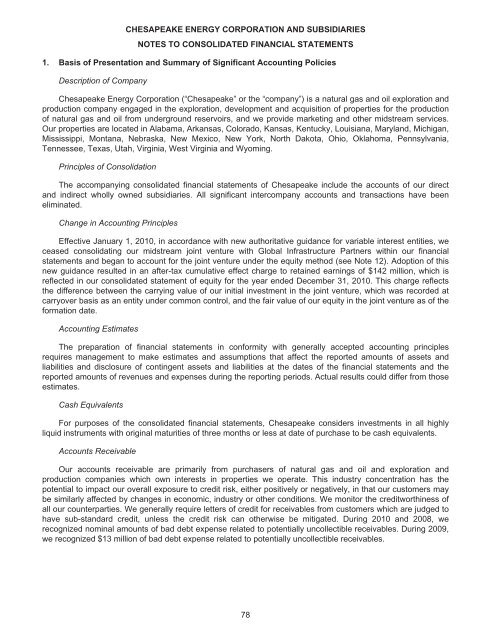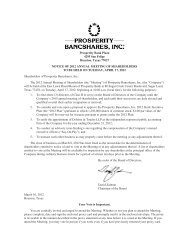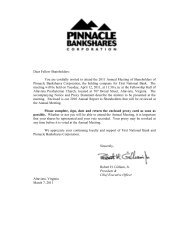6 5 - RR DONNELLEY FINANCIAL - External Home Login
6 5 - RR DONNELLEY FINANCIAL - External Home Login
6 5 - RR DONNELLEY FINANCIAL - External Home Login
Create successful ePaper yourself
Turn your PDF publications into a flip-book with our unique Google optimized e-Paper software.
CHESAPEAKE ENERGY CORPORATION AND SUBSIDIARIES<br />
NOTES TO CONSOLIDATED <strong>FINANCIAL</strong> STATEMENTS<br />
1. Basis of Presentation and Summary of Significant Accounting Policies<br />
Description of Company<br />
Chesapeake Energy Corporation (“Chesapeake” or the “company”) is a natural gas and oil exploration and<br />
production company engaged in the exploration, development and acquisition of properties for the production<br />
of natural gas and oil from underground reservoirs, and we provide marketing and other midstream services.<br />
Our properties are located in Alabama, Arkansas, Colorado, Kansas, Kentucky, Louisiana, Maryland, Michigan,<br />
Mississippi, Montana, Nebraska, New Mexico, New York, North Dakota, Ohio, Oklahoma, Pennsylvania,<br />
Tennessee, Texas, Utah, Virginia, West Virginia and Wyoming.<br />
Principles of Consolidation<br />
The accompanying consolidated financial statements of Chesapeake include the accounts of our direct<br />
and indirect wholly owned subsidiaries. All significant intercompany accounts and transactions have been<br />
eliminated.<br />
Change in Accounting Principles<br />
Effective January 1, 2010, in accordance with new authoritative guidance for variable interest entities, we<br />
ceased consolidating our midstream joint venture with Global Infrastructure Partners within our financial<br />
statements and began to account for the joint venture under the equity method (see Note 12). Adoption of this<br />
new guidance resulted in an after-tax cumulative effect charge to retained earnings of $142 million, which is<br />
reflected in our consolidated statement of equity for the year ended December 31, 2010. This charge reflects<br />
the difference between the carrying value of our initial investment in the joint venture, which was recorded at<br />
carryover basis as an entity under common control, and the fair value of our equity in the joint venture as of the<br />
formation date.<br />
Accounting Estimates<br />
The preparation of financial statements in conformity with generally accepted accounting principles<br />
requires management to make estimates and assumptions that affect the reported amounts of assets and<br />
liabilities and disclosure of contingent assets and liabilities at the dates of the financial statements and the<br />
reported amounts of revenues and expenses during the reporting periods. Actual results could differ from those<br />
estimates.<br />
Cash Equivalents<br />
For purposes of the consolidated financial statements, Chesapeake considers investments in all highly<br />
liquid instruments with original maturities of three months or less at date of purchase to be cash equivalents.<br />
Accounts Receivable<br />
Our accounts receivable are primarily from purchasers of natural gas and oil and exploration and<br />
production companies which own interests in properties we operate. This industry concentration has the<br />
potential to impact our overall exposure to credit risk, either positively or negatively, in that our customers may<br />
be similarly affected by changes in economic, industry or other conditions. We monitor the creditworthiness of<br />
all our counterparties. We generally require letters of credit for receivables from customers which are judged to<br />
have sub-standard credit, unless the credit risk can otherwise be mitigated. During 2010 and 2008, we<br />
recognized nominal amounts of bad debt expense related to potentially uncollectible receivables. During 2009,<br />
we recognized $13 million of bad debt expense related to potentially uncollectible receivables.<br />
78











